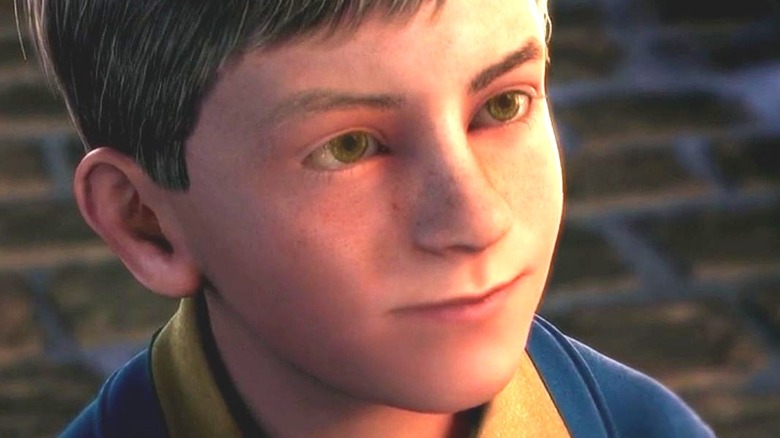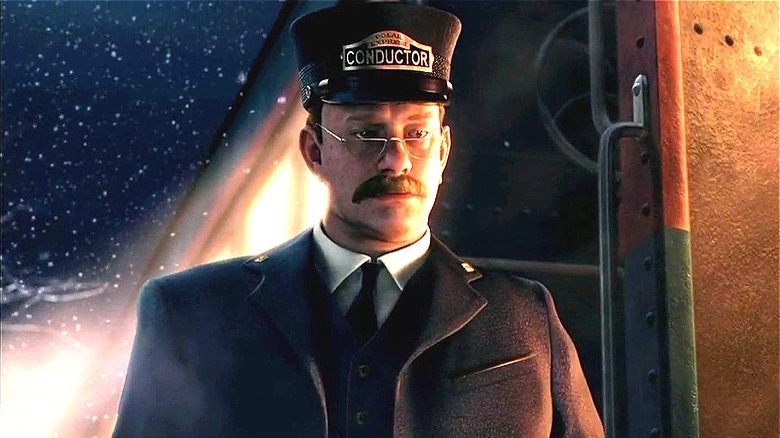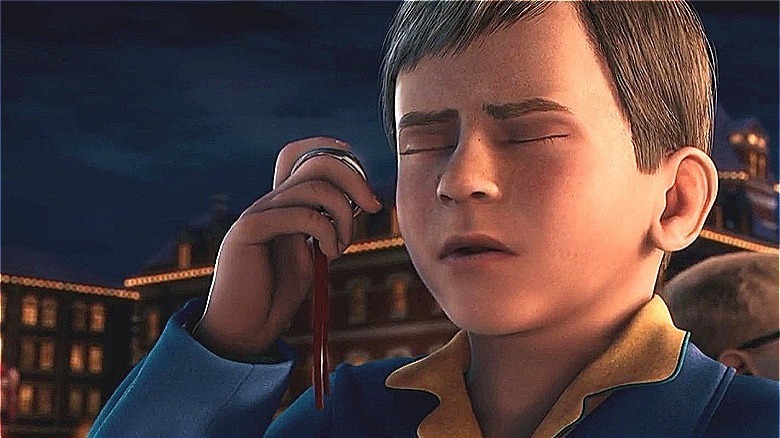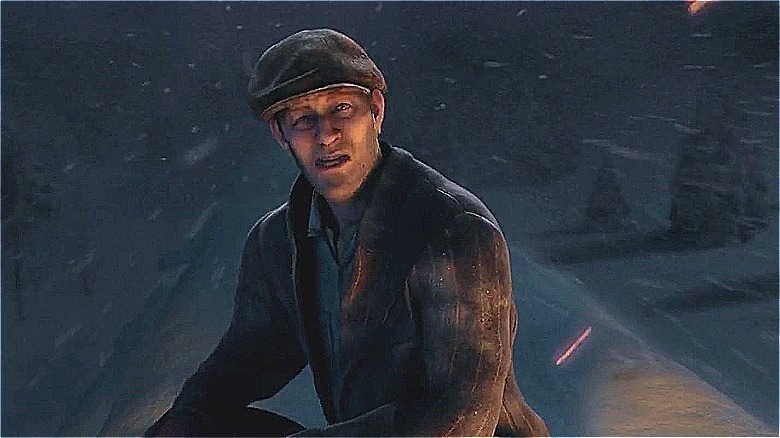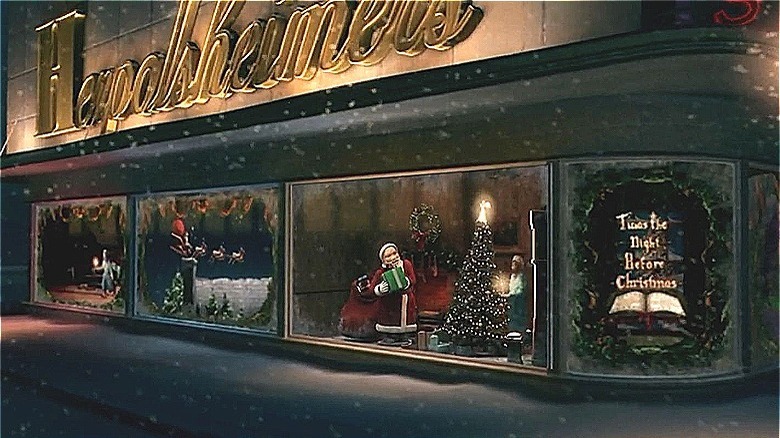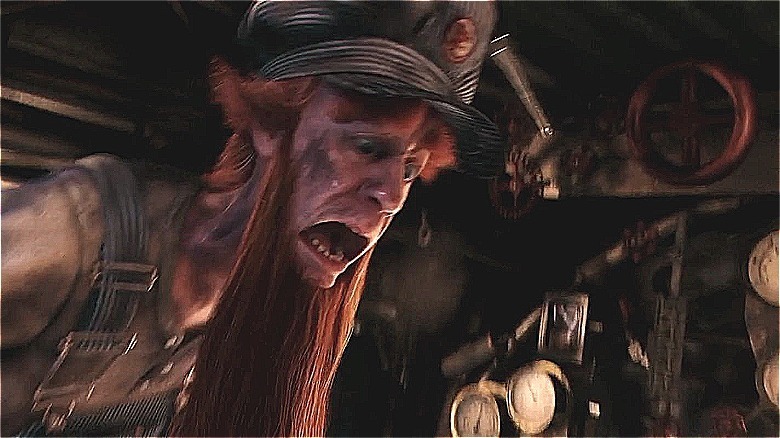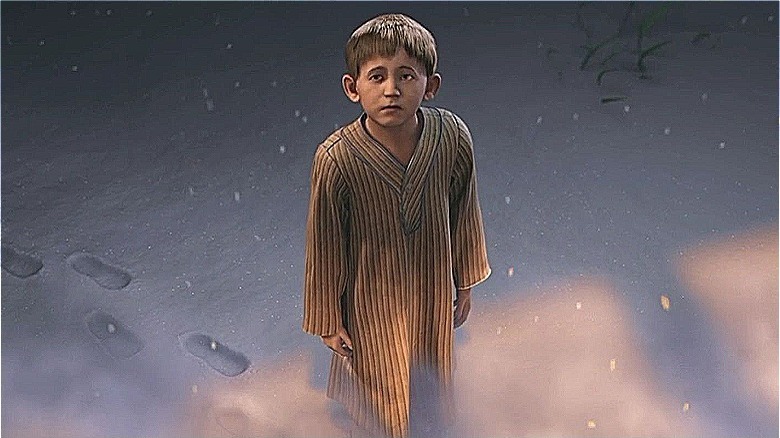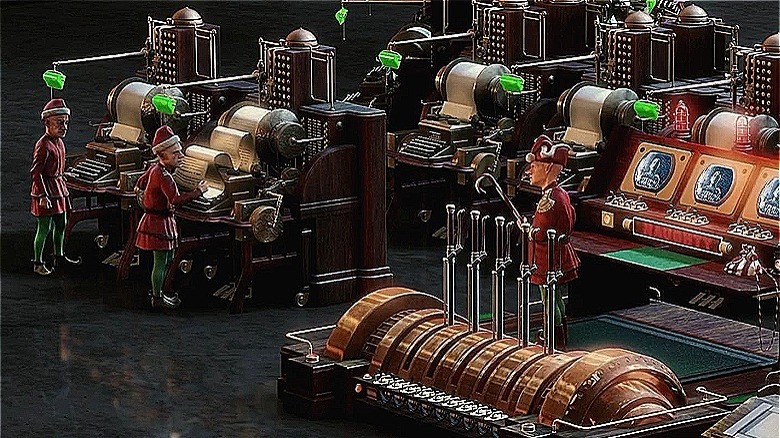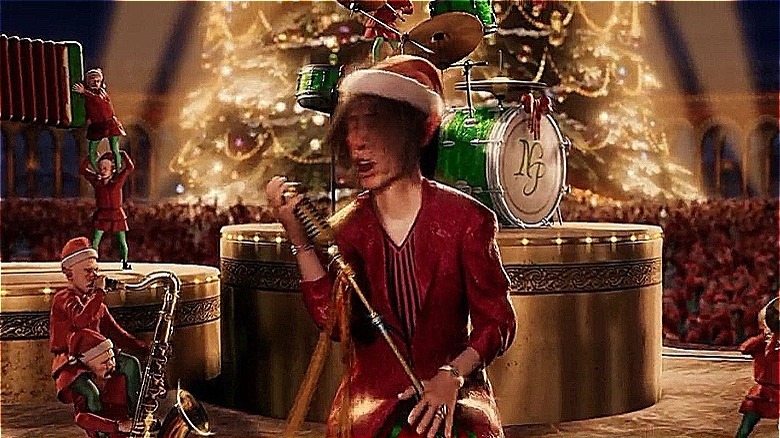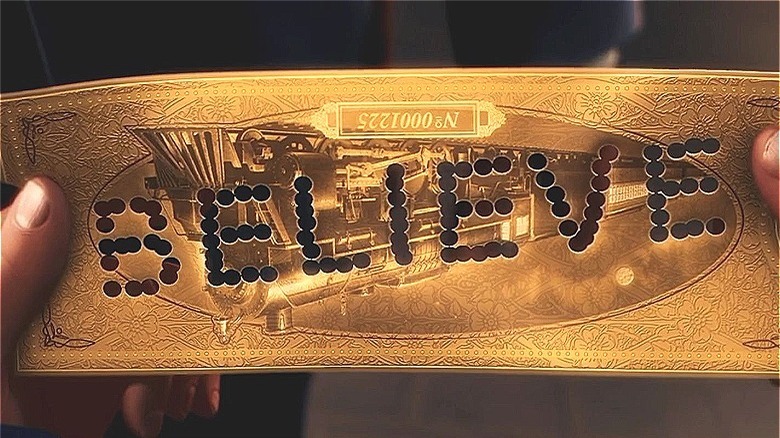Things Only Adults Notice In The Polar Express
It's been nearly two decades since the classic holiday adventure "The Polar Express" arrived in theaters. Directed by Robert Zemeckis, the computer-animated family film was based on the best-selling Chris Van Allsburg's children's book of the same name. Though it may not have been Tom Hanks' biggest movie at the box office, it was a successful film that managed to capture the imaginations of audiences for almost two decades. It also made movie history by being shot entirely with motion-capture performance technology -– the first of its kind (via Film Cred).
The film begins with a young boy who begins to doubt the existence of Santa Claus. On Christmas Eve, a magical train dubbed the Polar Express stops in front of the boy's house. The train's conductor (Tom Hanks) is a stern but kind man who invites the boy to come aboard. The train takes young passengers to the North Pole, where Santa Claus and his elves prepare for Christmas day. While taking in the amazing sights and making unexpected friendships, the boy learns the importance of faith and what it really means to experience the magic of the holiday season.
Many viewers of all ages have deemed "The Polar Express" as a required annual holiday viewing. However, those who have fond memories of watching the movie as a kid may notice a few things in it now that they missed as youngsters. Here are some of the details in "The Polar Express" that adults may pick up on but younger viewers might not.
The many faces of Tom Hanks
Known as the nicest man in Hollywood, actor Tom Hanks was an established star long before "The Polar Express." He not only plays a main role in the movie but optioned the original book in 1999. As a result, he also served as an executive producer of the film (via Wired). His face is instantly recognizable as the Conductor, but some younger viewers might not have realized that Hanks performed more than one role –- he actually appears as five different characters.
At the beginning and end of the film, Hanks' voice can be heard as the grown-up Hero Boy providing the narration. He played the Hero Boy's father and even provided the voice for the Hero Boy as an adult. As if that weren't impressive enough, Hanks also played the Hobo and Santa Claus for good measure.
When Hanks optioned the Van Allsburg book in 1999, he already intended to play the Conductor and St. Nick himself. At one time, Zemeckis tried to convince Hanks to take on all of the roles on his own, but Hanks quickly put the kibosh on that idea. Hanks once said in an interview with IGN, "On the day of tests that we did I played five or six or seven roles in the course of that day, and I said, 'Bob, I'm exhausted here.'" Preferring not to run himself ragged, Hanks instead lessened his number of roles to five.
The age of not believing
The beginning of "The Polar Express" introduces the Hero Boy (Daryl Sabara), who, on Christmas Eve, is eagerly awaiting Santa's arrival. Though he should be asleep, the boy is wide awake, hoping to hear a telltale sign of Santa's sleigh — the harness bells. However, it seems that the boy is going through a crisis of faith. He leafs through a pile that he's hidden away in a top drawer, which includes a photograph of a girl tugging on a department store Santa's beard, a newspaper clipping about Santas on strike, and a magazine with a boy holding a Santa costume and the headline: "The Discovery."
We see the Hero Boy squinting his eyes in suspicion as he begins to put the pieces together. He then takes out a volume from an encyclopedia and reads about the North Pole. The words in bold –- "stark," "barren," and "devoid of life" –- stand out the most. When the boy's parents come in to check on him, he pretends to be asleep as his mom and dad reminisce. "He used to stay awake all night waiting for Santa," the mother says, to which the father replies, "I think those days are just about over."
Many adults watching can relate to this moment in a child's life –- including, perhaps, their own. The moment kids stop believing in Santa is like a rite of passage. It's a sign that they are growing up, but there is bitterness to this milestone. The sacrifice of innocence is often followed by a loss of joy and wonder during the holidays, which can be a heavy burden to bear.
The train hobo
When the Hero Girl (Nona Gaye) forgets her train ticket, the Hero Boy bravely faces the stormy winter weather to return it to her. He climbs up on top of the train, which is traveling at full speed as he makes his way across the rail cars. After seeing a light in the distance that he mistakes for the Conductor's lantern, the boy pushes forward to find that it is actually a campfire. Sitting by the fire is a mysterious figure in ragged clothes playing the hurdy-gurdy.
The Hobo is one of the most enigmatic characters in "The Polar Express." He seems to appear and disappear at random times, and the Hero Boy is seemingly the only one who sees him. The Conductor later recalls when his life was once saved by an unseen figure, suggesting it may have been a ghost -– or an angel.
The origins of the Hobo are kept shrouded in mystery. In context, however, he is part of a fascinating piece of American history. As reported by BBC News, the practice known as train hopping (or freight hopping) began in the U.S. during the late 19th century. Hobos and thrill-seekers alike would hitch a ride on a passing train and travel the countryside. The tradition is often associated with the Great Depression era, when displaced individuals desperate for work would "ride the rails" in search of a job.
Train hopping is (and always has been) illegal due to the danger associated with the activity, and has resulted in many injuries and deaths. So it's not that far-fetched that the Hobo in "The Polar Express" might indeed be the ghost of a traveler who met an unfortunate end.
Window displays at Christmas
In the first act of "The Polar Express," the Hero Boy steps onto the train where he finds a load of excited children eager to reach their final destination, the North Pole. Unsure whether or not to trust his senses, he finds an empty seat and keeps to himself rather than interacting with the other kids. The boy's repose is interrupted when the obnoxious Know-It-All (Eddie Deezen) eagerly shows off his railroad knowledge while the girl next to him gives him a warm smile in greeting.
Suddenly, the Know-It-All kid points out that the train is passing by a Herpolsheimer's department store, and all of the passengers run to the windows to take a look. The kids "ooh" and "aah" over the shop's front windows, where a display of Christmas decorations has been set up. Music plays as an animatronic Santa lays out presents under a tree. At the sight of the clockwork mechanism on Santa's back, the Hero Boy turns up his nose, feeling justified by his newfound cynicism.
The younger generation of viewers will likely miss the reference to an old-fashioned tradition in this scene. Before online shopping and indoor malls took over, the department stores of the early to mid-20th century were located on street corners and in high-rise buildings. To draw in customers, business owners installed large display windows for potential shoppers to have a peek at their wares. They would then would go all out during the holidays, putting extravagant scenes that depicted the idea of a "perfect" Christmas -– and hopefully encouraging customers to spend more money.
The flux capacitor
As the Polar Express draws nearer to its destination, the train faces increasingly dangerous obstacles. After a close call with a herd of caribou on the tracks, the bumbling pair of engineers have even more trouble when the train's brake falls apart due to a lost pin. While attempting to catch the wayward mechanism, the scene shows a small detail in the background that is easy to miss if you're not paying close enough attention.
Adults may notice this well-hidden Easter egg as a reference to director Zemeckis's classic film series, the "Back to the Future" trilogy. In the first 1986 film, Doc Brown (Christopher Lloyd) invents a time machine that he places inside a DeLorean. As he relates to his young friend, Marty McFly (Michael J. Fox), a device he calls the flux capacitor is what makes travel through time possible. The flux capacitor is a shockingly simple device of lit-up wires inside a metal box, but thanks to movie magic, and a healthy suspension of disbelief, we are willing to go along for the ride.
The appearance of the flux capacitor in "The Polar Express" is not just a fun reference for adults, though. It also hints that the train's magic is powered by time travel, which would allow it to travel to the North Pole and bring everyone home again just in time for Christmas morning.
Christmas isn't always a happy time for everyone
After Hero Boy boards the Polar Express, the train makes one last stop for another passenger. Know-It-All announces they have reached "the other side of the tracks," indicating that the train has reached a poorer part of town. A lone house sits with a young boy standing out front. At first, he refuses the Conductor's invitation to board but changes his mind at the last second. With Hero Boy's help, the Lonely Boy makes it onto the train and takes a seat by himself in an empty car.
The lonely boy's name is Billy, and he eventually comes out of his shell to befriend Hero Boy and Hero Girl. When the Polar Express finally reaches the North Pole, Billy is reluctant to join the others in meeting Santa. He plaintively tells the others that "Christmas just doesn't work out for him." Thankfully, they encourage him to leave the train, and Billy accompanies the Hero Boy and Girl to explore the city.
When Billy finds a present addressed to him at Santa's workshop, he is desperate to hold onto the precious gift. "I've wanted one of these my whole life!" he declares. It's a big clue that Billy has probably not received many Christmas gifts in the past. As heartbreaking as it may be, Billy is a reminder that not everyone is lucky enough to have presents under the tree during the holidays.
A Jewish elf?
The glowing city at the heart of the North Pole is populated with possibly hundreds of thousands of Santa's elves. Though many of them have gathered to celebrate the evening's festivities, there are still some working hard on preparations for Santa's midnight ride. Meanwhile, Hero Boy, Hero Girl, and Billy have broken away from the rest of the group to explore the workshop.
Hidden from sight, the three kids come upon a small group of elves who seem to be performing last-minute adjustments to the Naughty and Nice List. A tower of monitors shows sleeping children snug in their beds, just as they should be. However, an alarm sounds when one little boy's prank threatens to put him on the Naughty List. The elf manager thinks long and hard before making the executive decision to let the boy's transgression slide — it is Christmas Eve, after all.
Besides their high-pitched voices, some viewers may note that Santa's helpers have a unique way of speaking. One of the elves relates that the wrapping department has just finished their last present with a Number Seven bow, to which the elf's chief replies, "What are they thinking down there? Are they meshuggeneh?" Most kids probably will have trouble recognizing the Yiddish word for "a person who acts foolishly" (via Collins Dictionary). What's notable is that the Yiddish language is traditionally spoken by people of Jewish descent –- which begs the question, is the elf overseer Jewish? Not that Santa wouldn't provide equal opportunity employment for elves of all faiths and backgrounds, but it's still definitely something to consider.
The Elf Singer is a famous rock and roll icon
The third act of "The Polar Express" is possibly the most magical part of the movie. We have the appearance of Santa Claus himself and the ceremonial first gift of Christmas in which the Hero Boy requests a bell from Santa's sleigh. The sleigh takes off into the sky, and Santa wishes everyone a Merry Christmas before disappearing in a shower of magical sparkling lights. The Christmas Eve celebration at the North Pole then kicks off with a bang as the crowd of elves in the city square cheer and throw their hats into the air. The cheers are followed by a seemingly impromptu rock and roll concert as a band begins to play a raucous tune titled "Rockin' on Top of the World."
Younger viewers probably won't be able to identify the band's lead singer, but adult fans of rock music are sure to recognize the Elf Singer as Aerosmith frontman Steven Tyler. The band first formed in 1970, although many of its biggest hits arrived during the '80s and '90s. Songs such as "I Don't Want to Miss a Thing," "Janie's Got a Gun," "Walk This Way," and "Crazy" are just a handful of the hits from the classic rock group. Tyler performed the motion capture for his character as well as the vocals for the song, which was an original track written for the film.
The rock 'n' roll icon only has a short cameo in the movie, but it's still a memorable scene. Look closely and you'll see a scarf wrapped around the microphone, one of Tyler's trademarks.
The true spirit of Christmas
For many adults, the joy of the holidays is overshadowed by stress, anxiety, and even depression. We long for the days of childhood when the season was a magical time — before we took on the cares and responsibilities we have now. In "The Polar Express," the Hero Boy's story is so relatable because we remember what it was like when we first lost the childlike wonder and excitement of believing in the unseen. Yet, at the end of the movie, the boy's faith is restored, and he continues to believe even into adulthood.
A line from the movie that comes up repeatedly is, "Seeing is believing." The Conductor later finishes the quote, taken directly from the source material, which says: "Seeing is believing, but sometimes the most real things in the world are the things we can't see." The quote refers to the idea of faith, a concept that comes so easily to children but can become nearly impossible for grown-ups. When the Hero Boy meets Santa and is presented with the first gift of Christmas, Santa reminds the boy that "The true spirit of Christmas is in your heart."
It seems easy that the Hero Boy would continue to believe in the magic of the holiday season, even into old age, because of everything he witnessed as a child. He could have just as easily dismissed the experience as a dream and lost the ability to hear the bell just like everyone else. Instead, he remembered Santa's words and took them to heart. If anything, "The Polar Express" teaches us that even though we all get older, the magical feeling we get during the holidays can still be preserved in our hearts — if we just believe it can.
